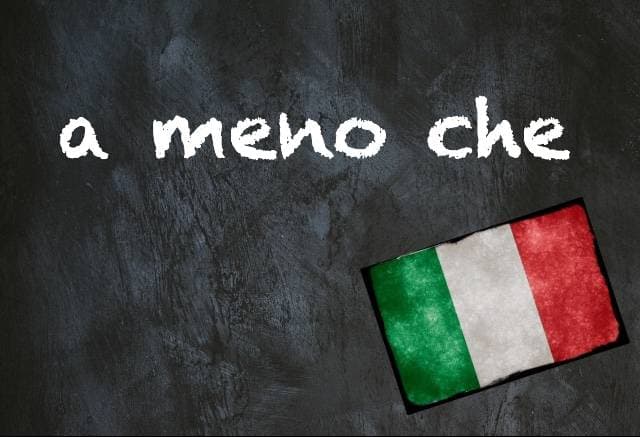Italian expression of the day: 'A meno che'

You might want some help mastering this phrase, unless your Italian is already advanced.
It's always helpful to have a little caveat up your sleeve when making plans - just in case something crops up and you need to change course.
In English, there's a pretty simple way to express this idea: we just use the word 'unless' followed by the present simple.
Italian, however, is a bit more complicated. We need to add a non after a meno che - something that can trip up anglophones - and then follow this with a subjunctive, since we're talking about a hypothetical situation.
Potremmo andare a fare un giro in bicicletta, a meno che tu non abbia da fare?
We could go for a bike ride, unless you're busy?
La festa si terrà all'aperto, a meno che non piova.
She'll have the party outdoors unless it rains.
To wrap your head around this addition of a negative, it can help to think of the Italian translation less as "unless XYZ is the case" so much as something along the lines of "as long as XYZ weren't the case."
A meno che is the most common variant you'll hear, but if you want to mix things up a bit, you could instead use any of salvo che, tranne che, or eccetto che.
Il rimborso sarà effettuato entro 24 ore, signora, salvo che Lei non cambi idea prima di allora.
The refund will be processed within 24 hours, madam, unless you change your mind before then.
L'intervento chirurgico non è necessario, tranne che i sintomi non causino dolore.
Surgery isn't necessary unless the symptoms are causing you any pain.
Unless you've been watching TV throughout this explainer, we're sure you'll be confidently using a meno che and its equivalents in no time.
Do you have a favourite Italian word, phrase or expression you’d like us to feature? If so, please email us with your suggestion.
Comments
See Also
It's always helpful to have a little caveat up your sleeve when making plans - just in case something crops up and you need to change course.
In English, there's a pretty simple way to express this idea: we just use the word 'unless' followed by the present simple.
Italian, however, is a bit more complicated. We need to add a non after a meno che - something that can trip up anglophones - and then follow this with a subjunctive, since we're talking about a hypothetical situation.
Potremmo andare a fare un giro in bicicletta, a meno che tu non abbia da fare?
We could go for a bike ride, unless you're busy?
La festa si terrà all'aperto, a meno che non piova.
She'll have the party outdoors unless it rains.
To wrap your head around this addition of a negative, it can help to think of the Italian translation less as "unless XYZ is the case" so much as something along the lines of "as long as XYZ weren't the case."
A meno che is the most common variant you'll hear, but if you want to mix things up a bit, you could instead use any of salvo che, tranne che, or eccetto che.
Il rimborso sarà effettuato entro 24 ore, signora, salvo che Lei non cambi idea prima di allora.
The refund will be processed within 24 hours, madam, unless you change your mind before then.
L'intervento chirurgico non è necessario, tranne che i sintomi non causino dolore.
Surgery isn't necessary unless the symptoms are causing you any pain.
Unless you've been watching TV throughout this explainer, we're sure you'll be confidently using a meno che and its equivalents in no time.
Do you have a favourite Italian word, phrase or expression you’d like us to feature? If so, please email us with your suggestion.

Join the conversation in our comments section below. Share your own views and experience and if you have a question or suggestion for our journalists then email us at [email protected].
Please keep comments civil, constructive and on topic – and make sure to read our terms of use before getting involved.
Please log in here to leave a comment.